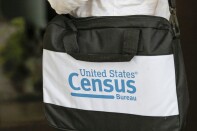This story is free to read because readers choose to support LAist. If you find value in independent local reporting, make a donation to power our newsroom today.
Trump closes loophole used by American shoppers to buy Chinese goods tariff-free

While President Donald Trump was levying massive tariffs on goods from around the world this week, he also moved to pinch off a popular trade loophole that allows American shoppers to buy low-cost goods directly from retailers in China and Hong Kong.
Popular e-commerce companies, including giants Shein and Temu, use the so-called "de minimis" exemption to ship tens of millions of packages — everything from end tables and lamps to shoes and underwear — to U.S. consumers every year.
So long as each individual package is worth $800 or less, they aren't required to pay import fees or go through typical customs inspections. But under an executive order signed by Trump Wednesday, that loophole will close on May 2.
These lower-value shipments will now face a tariff of 30% of the "value of the postal item containing goods for merchandise" with a minimum fee that will eventually rise to $50.

"We are really pleased," said Kimberly Glas, president of the National Council of Textile Organizations, a trade group that lobbied for the de minimis shipments to end, in part to protect U.S.-based manufacturers. "We think this was a huge step forward."
Critics of the de minimis exemption say it offered foreign firms backdoor access to American consumers. Over the last decade, international retailers have exploited the rule aggressively, growing the number of direct-sale deliveries to U.S. consumers roughly ten-fold from 2014 through last year.
But some trade experts say closing the loophole and adding what amounts to a hefty tax to low-cost goods will come at a steep cost for many shoppers.
A study published last year by the National Bureau of Economic Research, a non-partisan think tank based in Massachusetts, concluded Americans will wind up paying $10.9 billion to $13 billion more for purchases each year.
In an email to NPR, one of the paper's co-authors, Amit Khandelwal, predicted higher prices would fall most heavily on people with lower incomes who have used e-commerce purchases to lower expenses.
"We find that lower-income consumers take advantage of de minimis shipments disproportionally more than richer consumers," said Khandelwal, a professor of global affairs and economics at Yale University.
Fears of fentanyl and unfair competition
But while many of Trump's tariffs are controversial, efforts to close the de minimis loophole have drawn bipartisan support, with the backing of U.S. public safety, consumer protection and trade groups.
Last year, 126 House Democrats sent a letter to then-President Joe Biden urging him to use an executive order to apply inspections and duty fees to all direct shipments.
"We had 1.4 billion de minimis shipments last year," Glas said. "These [imported] items don't pay a tariff. There's no scrutiny. Which essentially equates to four million boxes coming in a day, with little information and no one to hold accountable."
Industry groups in the U.S. believe the direct, duty-free shipments have meant unfair competition for American factories and textile plants that make garments.
Some activists and U.S. government officials also believe the roughly 4 million packages now entering the country daily have become a significant source of smuggled street fentanyl and other contraband.
"Bad actors are exploiting this explosion in volume to traffic counterfeits [knock-off products that resemble name brand], dangerous narcotics, and other illicit goods including precursor chemicals and materials such as pill presses and die molds used to manufacture fentanyl and other synthetic drugs that are killing Americans," said U.S. Customs and Border Patrol officials in an October 2024 report.
The executive order signed by Trump this week cites fentanyl as a major factor in his decision to close the trade loophole.

This action only ends de minimis shipments from China and Hong Kong, which experts say will affect roughly 30 to 40% of these relatively low-cost international deliveries.
According to Glas, her coalition will now lobby the White House and Congress to close the loophole for all low-cost shipments reaching the U.S., not only from China but also from nations like Bangladesh, India and Vietnam.
"Member of Congress on both sides of the aisle have been supporting of closing de minimis for China and the rest of the world," Glas said.
One unanswered question is how U.S. officials will actually process, inspect and levy tariffs on the vast number of low-value packages now entering the U.S.
"Putting the systems in place to collect tariffs on a billion shipments [per year] will require large investments in infrastructure," said Amit Khandelwal at Yale University.
Indeed, Trump attempted to close this same trade loophole in February, but had to backtrack because U.S. Customs and Border Protection officials weren't prepared to handle the massive new task. White House officials say they're now ready.
"The Secretary of Commerce has notified me that adequate systems are now in place to process and collect tariff revenue for covered goods from [China and Hong Kong]," Trump said in his latest executive order.
Copyright 2025 NPR










